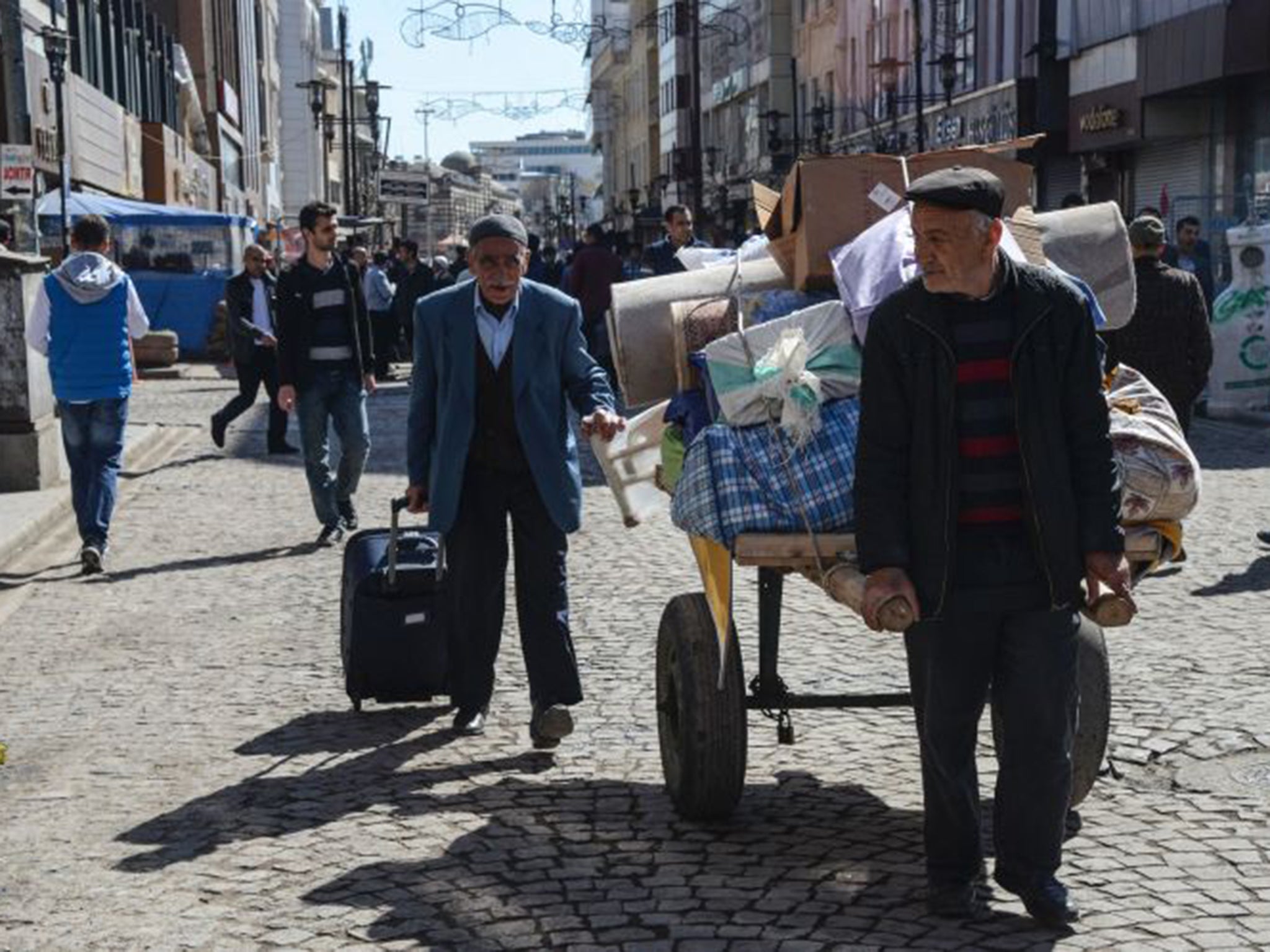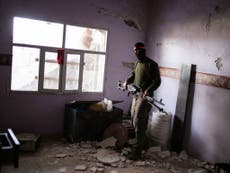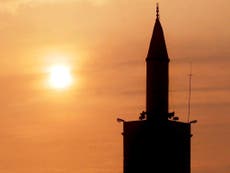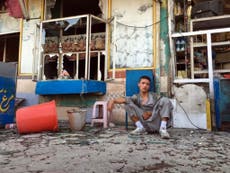This is what it feels like to be an ordinary Kurd caught in the tragedy of Turkey’s turmoil
This man’s story, told with the usual anonymity for this tragic place, must melt a heart of stone and so I tell it in his own words


There are moments – precious few, you understand – when you can believe in Kurdistan as part of Turkey. You hear the great wedding drum from far away, sinister, not unlike the Protestant Lambeg drum with all its sectarian reverberations, echoing, quite literally, off the walls of the city.
But there is nothing malevolent about the sweating man with the vast drum leading a column of young Kurdish-gypsy women around the big, cheap, tin-roofed hall beside the Diyabarkir city walls. They are laughing and dancing and waiting for the bride and groom, and my friend, a schoolteacher approaching what we used to call middle age – a man with three children and a wife who’s also a primary school teacher, who live in a flat in a leafy street outside town – watched with something close to amusement.
There are no Turkish police, no intelligence men, and the family cheerfully invite the foreigners to their celebrations without asking for our nationality – this is, after all, not the Arab world – and they also wave in our Kurdish schoolteacher friend without worrying about his politics or whether he might be (for many are) an informant for the police.
But he is a nervous man and he occasionally wrings his hands and glances at me with a mournful look. He may be out of work in a few days’ time because of the spitefulness of a government which should protect him.
His story – told with the usual anonymity for this tragic place – must melt a heart of stone and so I shall tell it partly in his own words, to demonstrate what it is like today to be an ordinary, honest, decent Kurd caught up in an ordinary, dishonest, vicious war and ruled by a spiteful government.
In the autumn of last year the PKK Kurdish “workers” party and the Turkish army were fighting every night in the streets of central Diyabarkir. “Shooting, bombs, explosions, they became normal to us and there was very bad destruction and by the winter there had been three months of war in the city centre,” my friend begins.
“People were dying and we were fearful of both sides. Sometimes the PKK didn’t want the children to go to school. I remember one day after they said this, we teachers all went to school to work. We had our duty to the children, whatever the PKK said. But the children didn’t come to school. We wanted to teach – but there was no-one to teach.
“So all the people, the ordinary people, wanted to do something. We all talked about ‘peace!’ but we couldn’t have peace. Our ‘peace process’ with the government was dying. Our teachers’ union became involved. It demanded a ceasefire, a peace, an end to fighting. I’m not a politician. I’m not even a member of the union, but I supported it when they called for a symbolic strike for peace.”
And here came my friend’s first problem. Kurdish civilians don’t give orders to the PKK – the PKK is an autocratic, un-socialist, unIslamist, almost Khmer-Rouge style outfit which fights with great bravery and almost total lack of compassion for anyone who gets in its way. Many of its newest tactics – fighting from tunnels, staging mass suicide attacks – crept over the border from the Syrian war and before that, I suppose, from Iraq. Certainly, there is evidence that it has killed more Kurds than Turks. So nothing as mundane as a teachers’ strike was likely to sway the PKK.
No, the teachers had to direct their complaint at the Turkish government which was also, of course, their employer. I’ll hand the story once more to my friend. “We teachers had to give a voice to peace. But of course, the target of our strike was the government. They were the authorities. It was their job to ensure peace in our city. But the government was very unhappy with our action. ‘Why don’t you talk to the terrorists?’ they asked us. They wanted us to talk to the PKK. ‘Why do you get angry with us and not with the others, who are the cause of the fighting?’ the government asked us. But how can we talk to ‘terrorists’? We can’t talk to the PKK. They don’t care.”
Northern Ireland Catholics, Basque separatists, Iraqi and Syrian civilians under occupation or under the control of regime armies – or Palestinians under Israeli military occupation – have all experienced the same problem. If you tell your own ‘side’ to stop fighting, you will be accused of being a collaborator. And even if you are successful, the government/regime/occupying power will then conclude that you obviously support “terrorism” – for why else would “your” side stop shooting at your request? So my friend and his thousands of teacher colleagues protested at the government.
“We had spent two quite happy years in Diyabarkir and the ‘peace process’ was working so when we objected to the fighting, we thought this would be a good thing that might help revive the ‘process’. I went on strike for a day – it was only symbolic, of course, I was back at work next day. And my wife, she went on strike just for one symbolic hour. We wanted peace, we said we wanted peace. We did not support the PKK. And then suddenly, out of the blue, this summer, months later – when we had almost forgotten our strike – we were told that of the 20,000 teachers, 10,000 would be suspended for taking part in the strike. We were stunned. We had never suspected this could happen. Why did it happen?”
Why, indeed. Well what really did happen – as we all now know – is that elements of the army and air force staged an attempted coup against President Recep Tayyip Erdogan on 15 July, an assault which was quickly put down by loyal elements of the army and equally loyal AKP party supporters, some of whom died for their opposition to the army mutineers. Down in Diyabarkir – in fact, all across Kurdistan – there was no support for the coup, indeed even a little sympathy (unstated, naturally) for Erdogan, because it had been his AKP party which had engaged in the “peace process” with the Kurds.
And it is a fact that the most ruthless units of the Turkish army, including paratroop battalions which were based in Kurdistan and fighting the PKK, were deeply involved in the coup attempt. That is why the overall commander of the anti-Kurdish insurgency – the army commander for the area in which my friend lives – has been arrested and is now in prison.
Erdogan imposed an immediate 90-day state of emergency – he has just renewed it – which means that all normal civil and judicial legal process is now subordinate to the government. Readers may be forgiven a growing but cynical smile of prescience as we turn back once more to my friend’s travails. “I thought when I heard they would suspend us that it was for just ten days – you know, a symbolic punishment for a symbolic strike. But no, the principal of my school called me in and told me I must leave my job immediately, that I was totally suspended, that I would not be paid, that this could be for months. The same happened to my wife.”
Incredibly, my friend’s voice does not rise in indignation as he speaks. That’s the Kurds for you. Injustice is second nature to them. For the point – the whole casting-into-darkness of thousands of schoolteachers – was carried out under the state of emergency. “Can you imagine? I and my wife and ten thousand others were suspended from our jobs because of something we did a year ago – under a state of emergency declared by Erdogan only in July — after an attempted coup that had nothing to do with us? Now, just today, they announced on the radio, that a percentage of the 10,000 suspended teachers will be dismissed altogether, that we will not be allowed to work again.”
My friend still does not know if he will be one of the permanently unemployed but there can be no doubt of the perniciousness of a Turkish government that manipulates a state of emergency against a Kurdish minority community that had nothing to do with the attempted coup. In the real world, that’s called sectarian. “I never thought we had done anything wrong when we called for peace last year,” my friend says. “An ordinary teacher has the right to speak out against war. Any human being must be against war. And because of the state of emergency, nobody can even speak out about the injustice being done to us now, as they would once have been able to. Now people can only stay silent.”
Which is why my friend must remain anonymous – though he must have the last word. “Most of my friends have now lost faith in the Turkish government. The government thinks they can do what they want. Erdogan was so strong, he didn’t need to do this. Now everyone in Kurdistan is expecting something to happen – it’s like before an explosion. It is our hope that nothing will happen until Erdogan passes away – and we hope he passes away very quickly.”



